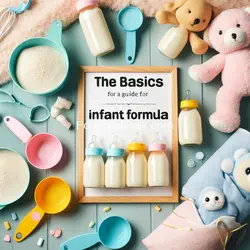
The Basics of Infant Formula: A Guide for New Parents
Hello, new parents! Today, we're diving into infant formula, a key topic for many families. Whether you're exploring formula options before your baby arrives or considering a switch, this guide is for you. Let's break down the essentials of infant formula to ensure your little one gets the best start.
What is Infant Formula?
Infant formula is a manufactured food for babies under 12 months old. It's a nutritious alternative to breast milk, packed with the necessary vitamins and minerals for your baby's growth and development. Several types of formulas are available, each tailored to meet different nutritional needs and health considerations.
Types of Infant Formula
- Cow's Milk-Based Formula is the most common type, made to mimic breast milk's nutritional profile. It's suitable for most infants and the most cost-effective. You can start with the store label or non-name brand version.
- Soy-Based Formula: This is a plant-based option for babies with dairy allergies, lactose intolerance, or families following specific dietary restrictions. We're still gathering data to see where this lands on the affordability scale.
- Hypoallergenic Formula: Designed for babies with allergies to cow's milk or soy proteins, it's easier on sensitive stomachs. Before jumping to the option, ensure your baby is tested so you're not wasting money on a formula you may not need.
When to Use Infant Formula
Using infant formula is a personal decision and can depend on many factors. Some parents choose formula initially, while others may switch from breast milk for health, dietary, or convenience. There seems to be a lot of stigma surrounding this option, but at the end of the day, you're doing what's best for your baby, so ignore the judgment and focus on what's important.
Consulting With a Pediatrician
Talking with a pediatrician before deciding on an infant formula is recommended. They can offer guidance based on your baby's health needs, nutritional requirements, and conditions like allergies or lactose intolerance. Your pediatrician will help you navigate the options and find the best fit for your little one.
Choosing the Right Formula
With so many brands and types on the market, picking the right formula might feel overwhelming. Here's a simple guide to make your decision easier:
- Consider your baby's needs: Start with your baby's health and dietary needs. For most infants, a standard cow's milk-based formula will do. However, alternatives like soy-based or hypoallergenic formulas might be necessary for those with specific conditions.
- Read the labels: Check the nutritional information and ingredients. Look for formulas fortified with essential nutrients like DHA and ARA, which support brain and eye development. This comparison is where FormulaSeek.com shines.
- Brand matters, but only sometimes: While brand reputation can indicate quality, the best formula is the one that meets your baby's needs. Feel free to try different brands if the first choice isn't perfect. I've seen people recommend a week or two on a new formula to give time for babies' digestive systems to get used to it.
Final Thoughts
Choosing an infant formula is significant, but it doesn't have to be stressful. Armed with the correct information and guidance from your pediatrician, you can select a formula that nourishes and supports your baby's growth and development. Remember, the goal is a happy, healthy baby, and many paths exist. Happy feeding!
Related posts in this guide
- The Basics of Infant Formula: A Guide for New Parents
- Decoding Infant Formula: Types, Brands, and How to Choose
- Getting Ready for Bottle Feeding: A Simple Guide for Parents
- How to Safely Prepare Infant Formula: A Step-by-Step Guide
- Mastering Bottle Feeding: Techniques and Positions for Happy Babies
- Understanding Baby's Hunger: A Guide to Feeding Cues
- Navigating the World of Bottle Feeding: Scheduling and Frequency
- Keeping It Clean: The Ultimate Guide to Bottle Feeding Hygiene
- Smooth Moves: Transitioning Your Baby from Formula to Solid Foods
- Navigating Baby Feeding Challenges: A Parent's Guide to Common Concerns



